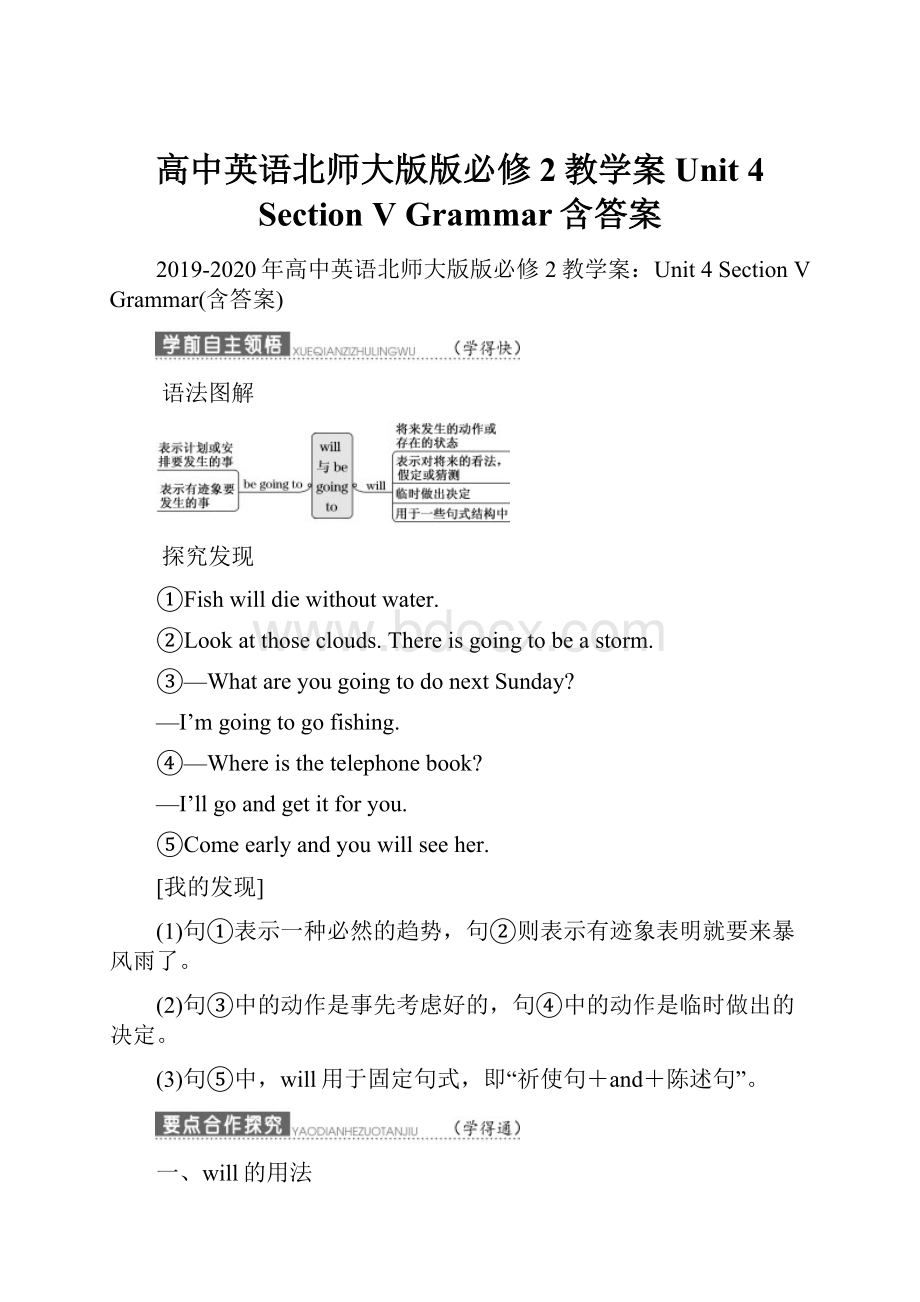高中英语北师大版版必修2教学案Unit 4 Section Ⅴ Grammar含答案.docx
《高中英语北师大版版必修2教学案Unit 4 Section Ⅴ Grammar含答案.docx》由会员分享,可在线阅读,更多相关《高中英语北师大版版必修2教学案Unit 4 Section Ⅴ Grammar含答案.docx(14页珍藏版)》请在冰豆网上搜索。

高中英语北师大版版必修2教学案Unit4SectionⅤGrammar含答案
2019-2020年高中英语北师大版版必修2教学案:
Unit4SectionⅤGrammar(含答案)
语法图解
探究发现
①Fishwilldiewithoutwater.
②Lookatthoseclouds.Thereisgoingtobeastorm.
③—WhatareyougoingtodonextSunday?
—I’mgoingtogofishing.
④—Whereisthetelephonebook?
—I’llgoandgetitforyou.
⑤Comeearlyandyouwillseeher.
[我的发现]
(1)句①表示一种必然的趋势,句②则表示有迹象表明就要来暴风雨了。
(2)句③中的动作是事先考虑好的,句④中的动作是临时做出的决定。
(3)句⑤中,will用于固定句式,即“祈使句+and+陈述句”。
一、will的用法
1.表示将来发生的动作或存在的状态
TheywillflytoBeijinginthreedays.
他们三天后将乘飞机去北京。
2.表示对将来的看法,假定或猜测
Ibelieveourcountrywillbecomebetterandbetter.
我相信我们的祖国会越变越好。
3.用于事先没有想到会出现某种情况,临时做出决定的句子中
—Thephoneisringing.Canyouanswerit?
—OK,Iwill.
——电话响了,你能接一下吗?
——好的,我马上接。
4.用于一些句式结构中
Ifhecalls,tellhimI’llringback.
如果他来电话,告诉他我将给他回电话。
Takethismedicineontimeandyouwillfeelbetter.
按时吃药你就会好起来。
[名师点津] 如果主句中使用了一般将来时,那么状语从句中常用一般现在时表将来。
Ifyouworkharder,you’llpasstheexam.
如果你再努力些,你就会通过考试。
[即时演练1] 完成句子
①Ithinkshewill_pass_the_exam.
我想她考试会及格的。
②Studyhardand_you’ll_make_progress.
努力学习你就能取得进步。
③Hewill_be_fortyonhisnextbirthday.
到下次生日,他就四十岁了。
④Wecannotalwaysdoas_we_will.
我们不能总是按照我们的愿望去做。
⑤Ifwetry_hard,_wewillbeabletofinishthework.
如果我们努力,我们就能完成任务。
二、begoingto的用法
“begoingto+动词原形”在口语中使用较多。
1.表示主语的意图,即将做某事
Iamgoingtobuysomethingtomorrowmorning.
明天早上我要去买些东西。
2.表示计划或安排要发生的事
Wearegoingtohaveaclassmeetingthisafternoon.
今天下午我们打算开班会。
3.表示有迹象要发生的事
Look!
It’sgoingtorain.
瞧!
快下雨了。
[即时演练2] 完成句子
①We_are_going_to_meetoutsidetheschoolgate.
我们打算在校门口见面。
②Weare_going_to_have_a_meetingtoday.
我们打算今天开会。
③Lookatthoseflowers!
They’re_going_to_die.
瞧瞧那些花吧!
他们就快要死了。
④Peteris_going_to_be_a_policemanwhenhegrowsup.
彼得长大了打算当警察。
三、will与begoingto用法区别
begoingto与will两者都可表示将要发生某事、将要去做某事,但它们有如下几点区别:
1.begoingto表示根据目前某种迹象判断,某事非常有可能发生,或近期、眼下就要发生的事情;will表示的将来时间则较远一些。
Watchout!
Thepileofboxesisgoingtofall.
小心,那堆盒子要倒了。
(根据客观迹象判断)
Therewillbeastrongwindinafewdays.
几天后将有一场大风。
(时间较远)
2.begoingto表示根据主观判断将来肯定发生的事情;will表示不以人的意志为转移的自然发展、将来势必发生的事情。
Heisseriouslyill.Heisgoingtodie.
他病得很重,可能要死了。
(主观判断)
Peoplewon’tlivewithoutwater.
没有水,人就不能生存。
(不以人的意志为转移)
3.begoingto含有“计划,准备”的意思,表示事先经过考虑、安排要做的事情;will则为临时作出的决定。
We’renotgoingtohaveanyclassesnextweek.
下周我们将不上课。
(事先安排好的。
)
There’ssomeoneknockingatthedoor.I’llgoandopenit.
有人敲门,我去开。
(并非事先安排而是临时决定的。
)
4.在有条件状语从句的复合句中,主句一般不用begoingto而多用will。
Ifitdoesn’traintomorrow,wewillgoshopping.
如果明天不下雨,我们将出去购物。
[即时演练3] 选词填空:
will,begoingto
①(2016·江苏高考改编)Moreefforts,asreported,willbemadeintheyearsaheadtoacceleratethesupply�sidestructuralreform.
②Hewillbetwentyyearsoldtomorrow.
③Iam_going_toquitmypresentjob.
④Look!
Thelittleboyis_going_tofallover.
⑤Whatwillwedoifitrainstomorrow?
⑥Thereis_going_tobeafootballgamebetweenItalyandGermanytomorrow.
⑦Getupearlyandyouwillkeephealthy.
四、表示将来的其他形式
1.beto+动词原形
表示按计划安排即将发生的动作,侧重于受别人的指示或安排要做的事,尤指注定要发生的事。
HeistovisitJapannextyear.
明年他将访问日本。
Ifnotwatered,theplantsaretodie.
如果不浇水,这些植物一定会死。
2.beaboutto+动词原形
多用来表示马上要做某事,不能与tomorrow,nextweek等表示明确将来时的时间状语连用。
常用句型为:
beabouttodosth.when...“就要做某事这时突然……”。
Thenewschoolyearisabouttobegin.
新学年开学在即。
Iwasabouttogiveupwhenmyfathercameandencouragedmetokeepgoing.(2014·福建高考书面表达)
我就要放弃时父亲来鼓励我继续努力。
3.现在进行时表将来
有些动词,如go,come,leave,arrive,stay,start等,可用现在进行时表按计划发生的将来动作。
TheyareleavingforShanghaitomorrow.
明天他们将去上海。
4.一般现在时表将来
根据日历、时刻表的规定一般不变的将来动作常用一般现在时,也可用于时间或条件状语从句中表将来。
Thetrainyouwilltakepullsoutat10:
00.
你要乘坐的那趟火车10点发车。
Whatareyougoingtobewhenyougrowup?
你长大后要做什么?
[即时演练4] 用适当的将来时态填空
①Herplanis_to_be(be)afailure.
②Waitamoment,Iam_coming(come).
③Iwas_about_to_leave(leave)whenthetelephonerang.
④Theplanetakes(take)offatninetomorrowmorning.
Ⅰ.用所给词的适当形式填空
1.Dickwill_be(be)ondutytomorrow.
2.—Annisinhospital.
—Oh,really?
Ididn’tknow.Iwill_go(go)andvisither.
3.Wheneveryoubuy(buy)apresent,youshouldthinkaboutitfromthereceiver’spointofview.
4.Mytrainleaves(leave)at8:
30am,soIam_leaving(leave)homeat8:
00tomorrowmorning.
5.—Idon’tknowifhewill_come(come)herethisafternoon.
—Ifhecomes(come)herethisafternoon,pleasetellme.
6.Theheadteacherissupposedtoreporttotheschoolmasterassoonasshearrives(arrive).
7.Closethedooroffearbehindyou,andyouwill_see_(see)thedooroffaithopenbeforeyou.
8.Ifitisfinetomorrow,wewill_go(go)tothepark.
9.Heisgoing_to_take(take)acoursethissummervacation.
10.Thefilmends_(end)at8o’clock.ThenIam_going_to_do(do)someshopping.
11.Mymother_is_coming(come)nextweekandisstayinghereuntilMay.
12.Iwas_about_to_do(do)myhomeworkwhenmyfathercamein.
Ⅱ.单句写作
1.(2015·全国卷Ⅱ书面表达)We’llalsospendsomefuntimetogethersinging,dancingandplayinggames,whichwehopewill_make_them_happy(会让他们高兴).
2.(2015·北京高考书面表达)Thiscampwill_open_on_July_20th(将在7月20号开放).
3.(2015·陕西高考满分作文)I_will_be_grateful(会很感激)ifyoucouldgivemeakindconsideration.
4.(2014·辽宁高考满分作文)Third,theprize�givingceremony_will_be_held(将举行)from15:
00to17:
00onJune18.
5.(2015·广东高考基础写作)Ifyouwouldliketohaveatry,youwillhavetospend125poundsandtheanalysis_will_be_completed(将被完成)in4to6weeks.
6.(2015·北京高考书面表达)Iam_going_to_take_part_in(打算参加)theDragonBoatTrainingCampthissummer.
7.(2015·天津高考满分作文)What_I_am_going_to_tell_you(我打算告诉你的事)isaboutthebookdonationfromourschooltoyourChineseclass.
8.(2014·浙江高考满分作文)Knowingthatourlibraryis_going_to_buy_books(打算买书),I’dliketogivesomesuggestions.
单元语法项目
(二)——真实条件句和虚拟条件句
语法图解
探究发现
①IfIamfree,Iwillvisitmygrandmother.
②Ifitisfinetomorrow,wewillgotothepark.
③Ifwehadtimenow,wewouldreaditagain.
④Ifhehadtakenmyadvice,hewouldhavesucceededinthetest.
⑤Ifitweretosnowtomorrow,theywouldnotgoout.
⑥Ifitshouldraintomorrow,wewouldstayhome.
⑦Ifyoucametomorrow,wewouldhavethemeeting.
⑧Ifithadrainedlastnight,thegroundwouldbewetnow.
⑨Withoutairandwater,therewouldbenolivingthingsontheearth.
[我的发现]
(1)例句①②为if引导的真实条件句,从句用的是一般现在时,主句用的是一般将来时。
(2)例句③~⑨为if引导的虚拟条件句;例句③表示与现在事实相反,从句谓语动词用过去式;例句④表示与过去事实相反,从句谓语动词用had+过去分词;例句⑤⑥⑦表示与将来事实相反,从句谓语动词有三种形式:
were_to+动词原形、should+动词原形、动词过去式。
(3)例句⑧为if引导的错综时间条件句,从句与过去事实相反,主句与现在事实相反。
(4)例句⑨为含蓄条件句。
一、真实条件句
真实条件句是指主句中的某一动作或状态是在真实情况下或有可能实现的情形下发生的。
在表示真实条件句的复合句中,表条件的状语从句和表结果的主句的谓语都用陈述语气。
如果主句是将来时,从句用一般现在时表将来。
Ifitrainstomorrow,wewon’tgotothepark.
如果明天下雨,我们就不去公园了。
Ifhetrustsyou,hewilltellyouthesecret.
如果他信任你,他会告诉你这个秘密的。
[即时演练1] 用所给词的适当形式填空
①Ifyouask_(ask)him,hewillhelpyou.
②Ifhefails(fail)intheexam,hewilllethisparentsdown.
③Ifshetelephones(telephone),letmeknow.
④Iwillnotgotothepartyunless_invited(invite).
⑤(2013·湖南高考改编)Ifnothing_is_done_(do),theoceanswillturnintofishdeserts.
二、虚拟条件句
1.三种基本的虚拟条件句
如果表示的条件根本不可能实现或实现的可能性很小,要用虚拟条件句。
其主从句都用虚拟语气。
具体结构见下表:
时间
条件从句谓语动词的形式
主句谓语动词的形式
与现在事实相反的假设
过去式(be一般用were)
+动词原形
与过去事实相反的假设
had+过去分词
+have+过去分词
与将来事实相反的假设
过去式(be一般用were)/should+动词原形/wereto+动词原形
+动词原形
IfIwereyou,Iwouldnotbesoproud.
如果我是你的话,我不会如此骄傲。
(与现在事实相反)
Ifyouhadworkedhard,youwouldhaveeasilypassedthefinalexamination.
如果你当时努力学习的话,就会轻松通过期末考试的。
(与过去事实相反)
Ifitrained/weretoraintomorrow,theopeningceremonywouldbeputoff.
如果明天下雨,开幕式就会被推迟。
(与将来事实相反)
[即时演练2]
(1)用所给动词的适当形式填空
①(2016·北京高考改编)Whydidn’tyoutellmeaboutyourtroublelastweek?
Ifyouhad_told(tell)me,Icouldhavehelped.
②(2016·天津高考改编)Iwaswearingaseatbelt(安全带).IfIhadn’tbeenwearingone,Iwould_have_been_injured(injure).
③(2015·北京高考改编)IfIhadn’t_seen_(see)itwithmyowneyes,Iwouldn’thavebelievedit.
④(2014·北京高考改编)Wewould_be_(be)backinthehotelnowifyoudidn’tlosethemap.
⑤Ifitshould_rain/rained/were_to_rain(rain),thecropswouldbesaved.
(2)单句改错
①Hewouldn’tfeelsocoldifhewasindoors.was→were
②Ifwehadstartedearlier,wecouldn’thadmissedthefirstbus.第二个had→have
③Ifhehadtime,hewillcome.had→has
2.虚拟条件句的几种特殊情况
(1)省略if的虚拟条件句
虚拟条件句中,如果有were,had,should时,if可省略,但要把were,had或should提到句首,变为倒装句式。
IfIwereatschoolagain,Iwouldstudyharder.
=WereIatschoolagain,Iwouldstudyharder.
如果我重新回到学校,我会更努力学习的。
Ifshehadbeenherefiveminutesearliershewouldhaveseenheroldfriend.
=Hadshebeenherefiveminutesearliershewouldhaveseenheroldfriend.
如果她早到五分钟,她就会看见她的老朋友了。
Ifheshouldcome,tellhimtoringmeup.
=Shouldhecome,tellhimtoringmeup.
他要是来了,让他给我打个电话。
[即时演练3] 句型转换
①Ifitwerenecessary,Imightresign.
→Wereitnecessary,_Imightresign.
②Ifyouhadinformedmeearlier,Iwouldn’thavesignedthecontract.
→Hadyouinformedmeearlier,Iwouldn’thavesignedthecontract.
③Youcouldmeetthegeneralmanagershouldyoucometomorrow.
→Youcouldmeetthegeneralmanagerifyoushouldcometomorrow.
(2)错综时间条件句
当条件状语从句表示的行为和主句表示的行为发生的时间不一致时,称为错综时间条件句,此时,主句和从句的谓语动词要根据各自所发生的不同时间选择适当的动词形式。
Ifyouhadlistenedtothedoctor,youwouldbeallrightnow.
如果你当初听了医生的话,身体现在就好了。
(从句动作指过去,主句动作指现在)
Ifheweretoleave,youwouldhaveheardaboutit.
如果他要离开,你早就会听说这个消息了。
(从句动作指将来,主句动作指过去)
(3)含蓄条件句
有时为了表达的需要,在虚拟语气中,不出现if条件句,而是以介词短语、并列句、副词、非谓语动词的形式出现,这种句子我们称其为“含蓄条件句”。
常见的介词(短语)有without...“没有……”,butfor...“要不是……”;连词有but“但是”,or“不然”;副词有otherwise“否则的话”。
Butfortherain,weshouldhavehadapleasantjourney.
如果不是因为下雨,我们旅途会很愉快。
Hewouldhavegivenyoumorehelp,buthewassobusyatthattime.
他本可以给你更多的帮助,但那时他太忙了。
[即时演练4]
(1)用所给词的适当形式填空
①Ifithad_snowed(snow)lastnight,itmightbeverycoldtoday.
②IfBillhad_told(tell)meyesterday,